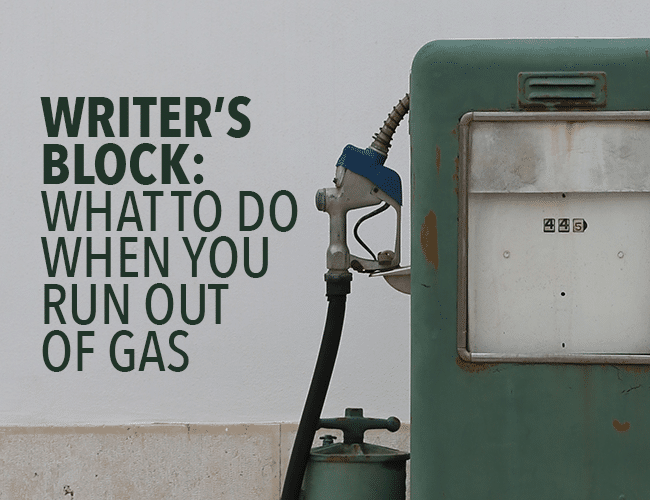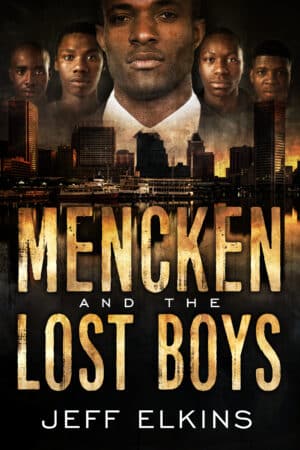For every writer, there comes a special kind of writer's block: a moment when we run out of gas. Maybe we’ve expended our final reserves of energy trying finish a big project. Maybe we’ve pushed too many days in a row to hit our NaNoWriMo word count. Maybe life has just made production difficult and we can’t muster the energy to get the next page out.

This moment, when we feel like we have nothing left, is inevitable. Therefore, it’s important that we have a plan in place for when it comes.
A Wave of Burnout
This happened to me recently. It had been a difficult summer for my family as my wife and I faced multiple emotional challenges together. At the same time, I was pushing myself to finish and publish my fourth novel, Mencken and the Lost Boys. After long and draining days at work, I forced myself to regroup, sit down at the table, and write.

In addition to the emotional stress of life, the writing was difficult. The story was emotional and intense. Also, much to my surprise, many scenes paralleled what was happening around me in the real world.
For example, I planned months before to write a funeral scene for chapter seven. Just as I was beginning to work through it, a friend died and I found myself sitting in a room much like the one I was writing about.
Thankfully, I was able to finish the book on time and get it to my editing team. To my surprise, they all said it was my best work.
Unfortunately, after it was done, I was completely spent. The last thing I wanted to do was write. Just thinking about starting the next book made me tired.
This is a dangerous place for writers. The creative process requires a large emotional investment. Building the motivation to share our thoughts with the world is hard enough on its own. If we can’t get excited about the work, then we may never finish anything.
4 Ways to Overcome Writer's Block and Recharge Your Writing
It’s critical that we have a plan in place to recover when we are down. Here are four things I do when I need to recharge:
1. Eat a good meal
The day I emailed Mencken and the Lost Boys to my editing team, I went to the grocery store and bought the ingredients for jambalaya. That night, I didn’t think about marketing the book. I didn’t write anything else. I didn’t worry about the outline for the next novel.
I cooked one of my favorite meals, had a glass of wine, and enjoyed the dinner.
There is something magical about food. On top of it being the literal fuel we run on, a great meal can have a positive emotional impact. When we are down, stressed, and running on empty, taking the time to enjoy something special, to treat ourselves, can help us recharge.
2. Take a nap
If you are like me, napping makes you feel guilty. When I try to rest, my mind races with all the things I should be doing. As I lie in bed, I can feel wasted time slipping away.
The pressure to produce is increased every time I look at Facebook and see someone championing their newest book. I watch authors I respect churn out a book every few months, and I am baffled by the output. My desire to keep up can make me crazy.
After finishing Mencken and the Lost Boys, I forced myself to stop working for a week. During my normal writing times, I rested. I caught up on TV shows I’d missed, I read a book I’ve been promising myself I’d try, and I went to bed early many nights.
When we hit zero, we need to give ourselves permission to rest. It is going to be okay if you take a day, or a weekend and don’t write. We do better work when we are full.
3. Find your recharge space
My wife is an extrovert. When she wants to recharge. She needs to hang out with friends. I am an introvert. When I need to recharge, I need to be left alone for an extended period of time.
As a father of five, getting time by myself is not easy. I often need to conspire with my wife to make it happen. After I finished Mencken and the Lost Boys, my wife took the kids out, giving me a night to myself.
I spent the evening smoking a big cigar while sitting on my back porch alone. It was wonderful sitting in silence, watching smoke drift into the air.
It’s important to understand we know what kind of space we need to recharge so that when we are on empty, we can sit in that space and refresh.
4. Write something completely different
Mencken and the Lost Boys is a supernatural thriller. It’s a fast-paced, action-filled, murder mystery. After eating a good meal, taking some time off, and finding some space to be alone, I wrote some short stories: a retelling of a Grimm Fairy Tale and a quirky conversation about trying to get free coffee.
Shifting the gears in our brain is good. Different types of stories demand we exercise different writing muscles. Pushing ourselves in different directions can recharge us and inspire us to future work.
Remember to Recharge
Coming to the end of our emotional energy is inevitable. When we do, we need to have a plan in place to recharge. These are the four techniques I use to overcome writer's block and refill my tank.
There are countless others. What helps you rest, recover, and get ready to write again?
Take note of the strategies that work for you. Then, the next time you're feeling burnt out, you'll have the tools you need to refresh yourself.
What do you do to recharge when you hit writer's block and all your words are worn out? Let us know in the comments.
PRACTICE
Take step four and give it a try. Spend fifteen minutes writing something different than what you usually do. If you usually write a novel, try your hand at a short story. If you usually write romance, why not write a mystery? Challenge yourself to exercise different muscles in your writing brain.
When you're done, share your writing with us in the comments. Be sure to leave feedback for at least three other writers!
Jeff Elkins is a writer who lives Baltimore with his wife and five kids. If you enjoy his writing, he'd be honored if you would subscribe to his free monthly newsletter. All subscribers receive a free copy of Jeff's urban fantasy novella "The Window Washing Boy."
Funny you should mention writer’s block and running on empty. I currently try the taking a nap method. Thanks for the insightful article and words of wisdom Jeff.
Writer’s Block is your internal editor telling you your story is going in the wrong direction. A reassessment is the best thing when you’ve lost your mojo.
I will challenge you on that and say thats an internal clock telling you an intresting right in the midst of where you are. Your own chaos can be added in a unique way.
Sorry, I didn’t understand the first sentence. Did you leave out a few words?
In the past when I experienced writer’s block I’d simply stop writing until I worked the problem out.
However, I’ve since discovered that writer’s block happens because I don’t know my story or characters well enough.
So now when I hit a snag in a story I’ll journal about it, and bounce ideas off myself as to possible fixes, and that usually helps.
And I recharge by reading, listening to music, watching TV/Netflix, going for walks, and exercising.
we never know our character until we have wrote out there story completely. Then, since we are in charge, we rewrite.
It’s great that there are so many ways to recharge and refill our creative well. I journal, too, and listen to music. I’ll play video games and imagine if I was writing the story, how I would narrate it.
Rest, and, relax…
simple, I like it
He was in his room, late at night, on the computer, going from web page to web page searching. He found it! He looked with immense attention. He paused in a minute, sitting his chin on his hands, in a deep thought look. He started drawing and calculating, figuring out he can get himself to the Mars. How he can be the first human on mars and begin harvesting the planet. He was researching aeronautical engineering, more specifically space and and space craft rocket propellers.
I have hit that wall before. I daydream myself to places I know (Cape Town, Abu Dhabi, El Salvador, etc.) and imagine I am writing the same story from those locations. I have my camera and mental images to document my feelings and ideas. I use the visuals to enhance my writing. This pushes the story to the finish!
I like that idea. I certainly would love to travel more. Having more images other than what I’m used to seeing would certainly help my creativity.
Travel is great and a blessing when gathering ideas for stories. The memories of the locations, people, and environments experienced are priceless when it comes time to do some writing. If you can’t travel, read and imagine!
Hmm. I’m not sure! At writing sites I’ve seen calls for content that made me think “What could anyone possibly find to say about this?” but not felt that I’d run out of words…my mind was full of words on other topics.
The week before last I wrote an e-book in *half* the time specified by the original contract, while coming down with an extremely boring little strep infection…last week I *did* feel sort of drained, but I think this was due more to fever than to writing the e-book.
Now I’m all verbose again and the question is whether anybody else wants to pay for any of the multitude of things I have to say 🙂
Well…I *liked* three other writers!
When I hit that wall, I turn to journaling. Sometimes, writing out my feelings on a project helps release some of the anxiety I feel. I like the idea of doing something different. I write contemporary fiction, but have been trying my hand at some other genres to keep my writing skills sharp. Plus, it’s something I’ve always wanted to try, but didn’t because it wasn’t something I knew how to write.
hlo Jeff Elkins sir
very nice articles
http://www.emetechnologies.com/industrial-training-in-chandigarh/6-months-cse-training-in-chandigarh-&-mohali.php
He looked with immense attention. He paused in a minute, sitting his chin on his hands, in a deep thought look. He started drawing and calculating, figuring out he can get himself to the Mars.
http://www.emetechnologies.com/industrial-training-in-chandigarh/6-months-network-training-in-chandigarh-&-mohali.php